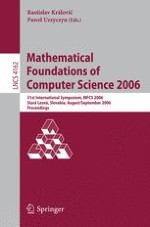2006 | OriginalPaper | Buchkapitel
Tree Exploration with an Oracle
verfasst von : Pierre Fraigniaud, David Ilcinkas, Andrzej Pelc
Erschienen in: Mathematical Foundations of Computer Science 2006
Verlag: Springer Berlin Heidelberg
Aktivieren Sie unsere intelligente Suche, um passende Fachinhalte oder Patente zu finden.
Wählen Sie Textabschnitte aus um mit Künstlicher Intelligenz passenden Patente zu finden. powered by
Markieren Sie Textabschnitte, um KI-gestützt weitere passende Inhalte zu finden. powered by
We study the amount of knowledge about the network that is required in order to efficiently solve a task concerning this network. The impact of available information on the efficiency of solving network problems, such as communication or exploration, has been investigated before but assumptions concerned availability of
particular
items of information about the network, such as the size, the diameter, or a map of the network. In contrast, our approach is
quantitative
: we investigate the minimum number of bits of information (minimum oracle size) that has to be given to an algorithm in order to perform a task with given efficiency.
We illustrate this quantitative approach to available knowledge by the task of tree exploration. A mobile entity (robot) has to traverse all edges of an unknown tree, using as few edge traversals as possible. The quality of an exploration algorithm
${\cal A}$
is measured by its
competitive ratio
, i.e., by comparing its cost (number of edge traversals) to the length of the shortest path containing all edges of the tree. Depth-First-Search has competitive ratio 2 and, in the absence of any information about the tree, no algorithm can beat this value.
We determine the minimum number of bits of information that has to be given to an exploration algorithm in order to achieve competitive ratio strictly smaller than 2. Our main result establishes an exact threshold oracle size that turns out to be roughly loglog
D
, where
D
is the diameter of the tree. More precisely, for any constant
c
, we construct an exploration algorithm with competitive ratio smaller than 2, using an oracle of size at most loglog
D
–
c
, and we show that every algorithm using an oracle of size loglog
D
–
g
(
D
), for any function
g
unbounded from above, has competitive ratio at least 2.
